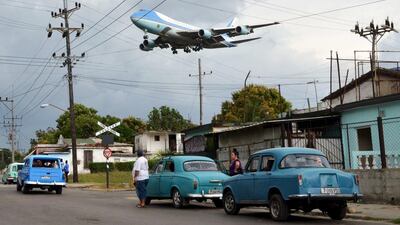The arrival of Barack Obama in Cuba is historic. He is the first US president to visit the country in nine decades and his presence marks the beginning of a new chapter in US-Cuban relations. Mr Obama is hoping to carve out his presidential legacy by ending decades of Cold War-style animosity between the two countries through executive orders that have eased travel conditions.
The visit is a physical reminder that Fidel Castro’s communist Cuba is fading into history. The Cold War is over. The impending end of the Cuban-American standoff is one of the final acts in the defining political battle of the 20th century. From an American perspective, thawing relations with Cuba will help Washington mend bridges with Latin American countries such as Venezuela and Bolivia. And for Cuba, the end of the embargo means trade with its large northern neighbour can resume.
There is still much work to be done in rehabilitating the relationship between Washington and Havana. The US has demanded improvements to Cuba’s human rights record and the dismantling of the communist police state. The economic embargo, placed on Havana following the seizure of American assets in the 1959 revolution, must also be lifted for business relations to restart between the two countries. (The two are linked: removing the embargo also removes the regime’s justifications for a police state and a stagnant economy.)
For this to take place, the Republican-controlled US Congress would have to approve – and the probability of this happening in the waning months of Mr Obama’s presidency is slim. Congress will press Cuba to move towards greater democratisation in exchange for lifting the embargo.
The United States is in the process of a massive recalibration of its foreign policy around the world, not just in Latin America. By removing the Cuban stumbling block, other countries in the region will have to recalibrate their foreign policies. That, indeed, is exactly what is happening around the other great US foe that it now no longer sees as quite such a fierce opponent: Iran.
But there, the thaw in relations is forcing unhappy changes, with some of America’s long-term allies in the Middle East changing their political calculations as sanctions end. An unhappy parallel then: in Cuba, the end of the embargo will bring an end to regional tensions. In the Gulf, the end of sanctions has only exacerbated them.

